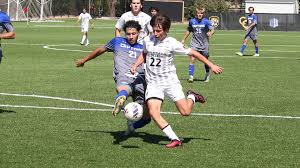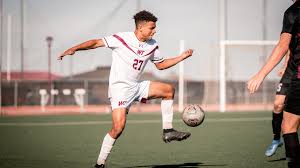May 23, 2024
•
Guides
How to Tell if a College Soccer Coach is Really Interested in Recruiting You

The latest on everything
College Soccer

Get our 5-minute, daily newsletter on what matters in college soccer.
How Can I Tell If I'm Being Recruited By A College Soccer Coach?
As a high school soccer player with dreams of playing at the collegiate level, there's nothing more exciting than receiving contact from a college coach or program. It's a sign that your hard work and talent are being recognized and that you're one step closer to achieving your goals.
However, not all college coach communication is created equal.
Just because you've received a letter, email, or phone call from a coach doesn't necessarily mean you're being actively recruited. In fact, many college programs send out hundreds or even thousands of generic letters to high school athletes each year as a way to gauge interest and cast a wide net.
So, how can you tell if a college soccer coach is truly interested in recruiting you?
Let's break down the different levels of coach communication and what they really mean.
The Mass Mail-Out
If you receive a typed letter from a college soccer program addressed to "Prospective Student-Athlete" or something similarly generic, don't get too excited just yet. These mass mail-outs are often sent to a large number of high school players and are designed to introduce the program and encourage you to fill out a recruiting questionnaire.
While receiving one of these letters is a positive sign that you're on the program's radar, it doesn't necessarily indicate a high level of personal interest. Coaches use these letters to gather information and build their recruiting database, but they may not have evaluated your specific skills or potential fit for their team yet.
The Personalized Letter
If you receive a handwritten or personalized letter from a college coach, it's a stronger indication that they have taken notice of you as an individual player. Handwritten letters take more time and effort than a mass mail-out, so coaches typically reserve them for recruits they have a genuine interest in pursuing.
However, it's important to keep in mind that even personalized letters are not a guarantee of a scholarship offer or roster spot. Coaches may send out dozens of these letters to players they are considering, but they will ultimately only have a limited number of spots to fill.
The Email Inquiry
When a college coach reaches out to you directly via email, it's a clear sign that they are actively interested in recruiting you. Email communication allows for a more personal and detailed exchange of information, and coaches often use it to ask specific questions about your soccer experience, academic record, and college goals.
If you receive an email from a coach, be sure to respond promptly and professionally. Provide the information they have requested, express your interest in their program, and ask any questions you may have about the team, school, or recruiting process. Building a positive rapport with a coach via email can be a key step in the recruiting journey.
The Phone Call
Perhaps the strongest indication of a coach's interest in recruiting you is a personal phone call. Due to NCAA rules and time constraints, coaches are selective about which recruits they reach out to via phone, so if you receive a call, it's a clear sign that you are a priority for their program.
During a recruiting call, a coach may want to discuss your soccer abilities, academic profile, and character in more depth. They may also invite you to visit campus, attend a camp or showcase, or schedule an official visit. These are all positive signs that the coach is seriously considering you as a potential addition to their team.
The Verbal Offer
The ultimate sign of a coach's interest in recruiting you is a verbal offer of a roster spot or scholarship. While verbal offers are not legally binding and must be followed up with an official written offer, they are a strong indication that the coach sees you as a valuable asset to their program.
If you receive a verbal offer, it's important to ask questions and gather as much information as possible about the terms of the offer, the program's expectations, and the next steps in the process. You should also take time to discuss the offer with your family, high school coach, and any other trusted advisors before making a decision.
The Bottom Line
Navigating the college soccer recruiting process can be complex and sometimes confusing, especially when it comes to interpreting coach communication. While receiving any form of contact from a college program is exciting, it's important to understand the different levels of interest and what they really mean.
As a general rule, the more personalized and direct the communication, the stronger the indication of a coach's interest in recruiting you. Mass mail-outs and generic letters are a good starting point, but it's the personalized emails, phone calls, and verbal offers that really signal a program's serious intent.
Remember, the recruiting process is a two-way street. While it's important to gauge a coach's level of interest in you, it's equally important to evaluate whether their program is the right fit for your academic, athletic, and personal goals.
Related
#1 College Soccer Newsletter
Join thousands of current readers and get our 5-minute, daily newsletter on what matters in college soccer.





